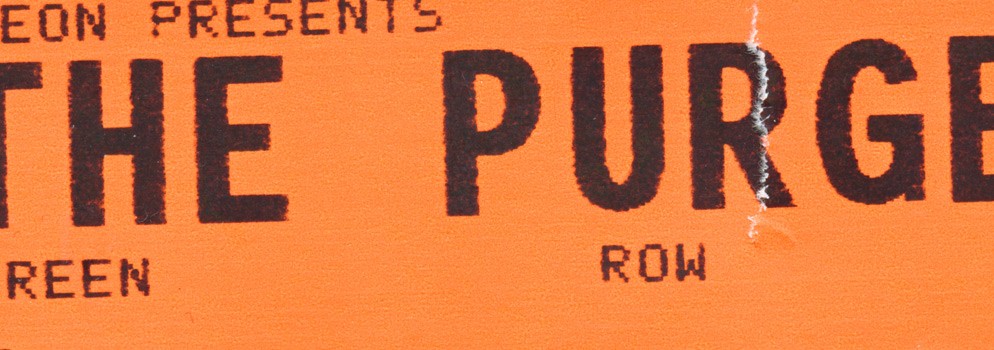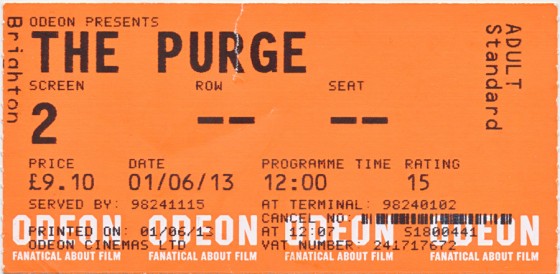The Purge

New! Improved! Danger! Without the risk!
After Cabin in the Woods, can we really have any more films about cabins? In or out of the woods? Likewise, post The Incredibles, do we really have to put up with monologing?

The otherwise creditable The Purge quickly falls apart in this most unfortunate of ways. The first fifty minutes of the film are not unimpressive. The set-up – the purge being a modern day ritual where there are no laws for twelve hours – could have equally disintegrated into pedanticism, but there’s a lived in sense of reality here. Details of the casual middle class as they prepare to watch the poor kill each other on TV, commentators telling them that it’s maybe not okay to watch the poor getting killed, followed by an elegant expositional moment loaded in a emergency broadcast message halfway in. Up to that point, we were relying on hints as to what the purge is, even though, of course, as trailer watchers and review readers, we know.
This might be called the greenlight moment, where they give away the story and get the investor all hot and bothered. Unfortunately, this would tend to underline the difference between reading the script and making the movie, the difference between the kicks you get from reading it the very first time, kicks that cause you to give a project the go-ahead without thinking about all the stages it’s going to endure before that moment that made you want to make it is ruined.
Like all great villains, you want to be just like him.
vIf I had some kind of forum to opine further on this idea, I would, but in any case there isn’t time! I had a whole week to beat the US release date (how great that this very American film came out here first), and my laziness, and also the fact that who really cares, caused me not to. Anyway, even after the set-up the film is still going strong. There’s my favorite element of narrative: choice, as the kid lets in the homeless guy running from the rich, and Mr. Hawke’s choice over whether or not to give him up to the mob outside. Also, a great villain; he’s just such a happy guy. Like all great villains, you want to be just like him. Hey, I wish I liked my job. Which is writing this, so I do?
So I am?
And then something happens, which isn’t just about the monologing. The characters stop making choices, and so do the filmmakers. It falls apart (as does say, Django Unchained, about which I should write. Hey, maybe I’ll beat the release date for the sequel on VHS in Viet Nam) when the filmmakers make a choice, in this case to allow the boyfriend to die. See, the bit is that he is there to kill the dad legally so he can date the daughter without objection. Nice, and lived through, and also nice that we sort of know he’s going to, and even the daughter seems to know. Lot of good details. But then the dad shoots him and he dies. And then all hell fails entirely to break loose.
See, that was an opportunity to really have some fun. There’s a homeless guy wandering around, the boyfriend wants to shoot you, and crazy rich people are about to bust into your house. And then you take something… out of the equation?
I suspect, though cannot prove, there’s some kind of moral here, about how violence is bad, unless you’re enjoying re-enacting it, filming it, and getting paid a lot of money to have people like me watch what you were filming. We want to have our cake and fill it full of exploding glass shards and toss it out the flaming helicopter into the bad guys’ open mouths. Too. I said it was an American film.
Having made a bunch of interesting choices, the characters are now left without any, in a house with no lights and no geography. This is the equivalent of watching a chase scene in a theater in Los Angeles. Yeah, I know, they just made a left on Olympic and Sawtelle so they could take the fourth street bridge. Hey, they were on their way to Long Beach! You can’t hear the appreciative nods of the Angelinos out there, but neither can I. They’re nodding.
In the case of The Purge, we’re now in an MC Escher house, built not so much for the optical illusion as for the lack of it, for the purpose of concealing the way in which people can just suddenly show up. Like many a film locale, bad guys appear, capture someone – and let me explain that this happens four times – and then are killed by someone else just at the last second. After, as I may have mentioned, telling us how evil they are and so on.
Look, I wish that I lived somewhere where I could play video games while preparing a meal in bed, but in a movie, characters being able to appear and disappear is for the convenience of, well, scaring us isn’t exactly right. Making the vague nod towards the indication of the shadow of thinking we’re scared so that we can check the box that we’re in this spot in the movie, is, and has, as this sentence has already become, dull.
I guess I would say that even the monologing isn’t about monologing, because this ridiculous motif, which we’ve seen a thousand times before, is about the covenant with the audience. Mr. James DeMonaco has to put the characters in jeopardy, yes, but if he can take them out and put them in anytime he wants, it breaks the covenant. It’s like seeing a scientist threaten to torture a puppy, okay that’s too harsh, slightly scare a puppy, then not, then threaten again, and so on. It’s like reality TV, except…
I can’t stop thinking about that scientist. I’m going to kill him.
Me killing that scientist is a story; watching him is not. And so we go back to choice and geography. The characters here choose their situation, then fail to choose a way out of it.
In one sense, I’m grateful, since I don’t want any film to be better than the film I’m currently writing (for hints, see ‘I ain’t dead yet, Cuarón‘), but this was an opportunity to put choice in the action, instead of cheap darkly lit rooms where anything can happen. There are films like Unbreakable and À bout portant and even Cabin in the Woods in which cases, I recommend exiting in the last minute. Here, I would recommend leaving after the first half and restaging whatever version of the film with whatever legomen you have at hand, putting them in and out of your lego castle. This is what I mean by a script, and why, if you read the second paragraph carefully, my films never get ruined.
The Take

$5.00
The Lonely Comments Section

 [logo]
[logo]
